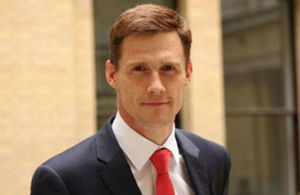What do you think of the 25 January 2011 revolution now?
Tahrir Square gave us one of the defining symbols of the twenty-first century so far.

Ambassador John Casson
What do you think of the 25 January 2011 revolution now? There is a famous story that when in 1972 American diplomat Henry Kissinger asked Chinese leader Zhou Enlai about the French Revolution two centuries earlier, Zhou replied, “It’s too soon to tell.”
So we should not be surprised that just five years after the dramatic events that ended President Mubarak’s presidency, opinions remain divided about what was achieved.
Tahrir Square gave us one of the defining symbols of the twenty-first century so far. Millions of Egyptians participated and the world held its breath to see what empowered Egyptians could do. And as Murtada Mansour has recently reminded us, the sacrifices of those who called for freedom, human dignity and social justice are honoured in Egypt’s new constitution.
But in the 60 months since, a lot has happened. In Egypt, economic and political turmoil and, in 2013 the toppling of the Muslim Brotherhood after a turbulent year in power. Across the region, war, repression and terrorism have killed more than 300,000 people, as well as many hundreds in Egypt.
So as Egypt contemplates the fifth anniversary of January 2011 we hear people saying that the dreams of 2011 have failed. Others say the Revolution was a naive mistake which opened the door to chaos. Worse still, some argue that the revolution was in fact an illegitimate uprising, or a veiled coup, or a foreign conspiracy.
To all of these people I humbly suggest, remember Zhou Enlai. It is too soon to know the real impact of 2011.
In 2011, Egypt produced fearless heroes who taught us important lessons. They showed that Egyptians themselves can and should define the future of their country. They shone a spotlight on problems too long ignored: declining Government services, corruption and economic inequality, a lack of accountability for political decisions and security actions. They rejected the paternalism of those who say freedom and justice are good for other continents, but not suitable for Arabs and Egyptians.
These lessons hold true today. The countries that succeed in the twenty-first century will be those who empower their citizens as the engine of the future, instead of seeing them as a burden or a threat. Security is vital, but it cannot come at the expense of modernisation or people’s rights or it will fail. Long-term success calls for competent and accountable Government services, especially high quality education that supports innovation and critical thinking. It calls for more open economies with a bigger role for the private sector and a smaller role for Government. It calls for protecting individual rights, and balancing state power with the rule of law and open debate.
But the years since 2011 have taught us other lessons too. Real change is not just about one slogan or removing one leader. Progress is not just tearing down, but protecting and building up. Democracy is not just elections, but growing deep values and institutions in Egyptian soil. Deep and lasting change also requires the quiet, patient work of reform. Look at the French revolution of 1798, the uprisings of 1848, the Prague Spring of 1968, South Africa in 1976: the seed of change was buried at first, but after a generation, transformation flourished through positive, gradual change.
So if 2011 gave us Egyptian heroes who spoke the truth without fear, realising their vision needs a different sort of hero too. Educators teaching a new generation to believe in themselves, to innovate and think critically. Entrepreneurs investing in jobs and skills for Egyptians. Technocrats designing economic reform. MPs holding the Government to account. Journalists uncovering lies and spreading transparency. Citizens improving their communities with volunteering and advocacy. Activists growing new ideas and support for grassroots change. Judges protecting individuals from abuse and uncovering corruption. Police protecting people and human values. Religious scholars rekindling the values of tolerance and mercy. Leaders with a vision of a modernised Egypt of opportunity and openness.
And God willing, foreign Ambassadors supporting these Egyptian heroes with practical, positive partnership.
It may be too soon to judge the 2011 Revolution, but it is not too late to shape the outcome. Whether 2011 was the dawn of a historic transformation or a false start will be decided not by the last five years but by the next twenty. The outcome depends on the unsung heroism of people creating accountable institutions and empowered citizens, on Egyptians refusing to abandon hope that they can have a future better than just extremism or authoritarianism.
So let’s agree. Asking, “What do you think of the January Revolution?” is the wrong question. It’s time to ask, “How can we turn the vision of 2011 into deep and lasting change?” As in 2011, so now, the future still lies in Egyptians’ hands.